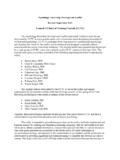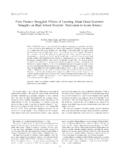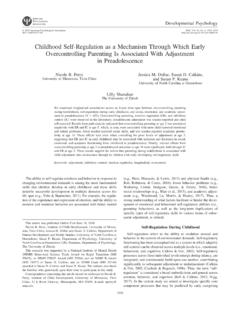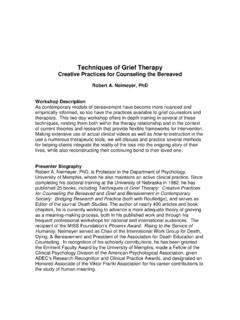Transcription of The Psychology of Working Theory
1 The Psychology of Working TheoryRyan D. DuffyUniversity of FloridaDavid L. BlusteinBoston CollegeMatthew A. DiemerUniversity of MichiganKelsey L. AutinUniversity of FloridaIn the current article, we build on research from vocational Psychology , multicultural Psychology ,intersectionality, and the sociology of work to construct an empirically testablePsychology of WorkingTheory(PWT). Our central aim is to explain the work experiences of all individuals, but particularlypeople near or in poverty, people who face discrimination and marginalization in their lives, and peoplefacing challenging work-based transitions for which contextual factors are often the primary drivers ofthe ability to secure decent work. The concept of decent work is defined and positioned as the centralvariable within the Theory . A series of propositions is offered concerning (a) contextual predictors ofsecuring decent work, (b) psychological and economic mediators and moderators of these relations, and(c) outcomes of securing decent work.
2 Recommendations are suggested for researchers seeking to use thetheory and practical implications are offered concerning counseling, advocacy, and public : Psychology of Working , decent work, social class, marginalization, work volitionUnderstanding the role of work in people s lives has been acenterpiece of counseling Psychology since the field s inception(Blustein, 2006; Savickas & Baker, 2005). Over the last 60 years,several overarching theories have been proposed attempting toexplain how individuals make career decisions and are ultimatelysatisfied with work, grounded in developmental (Gottfredson,2005; Hartung, 2013), person-environment fit (Holland, 1997;Swanson & Schneider, 2013), social cognitive (Lent, 2013; Lent,Brown, & Hackett, 1994), and constructivist (Savickas, 2013)perspectives. These theories mainly place internal and individual-level factors ( , self-efficacy beliefs, differentiation of interests)in the conceptual foreground while placing contextual and struc-tural factors ( , economic constraints, racialized or gendereddiscrimination, and marginalization) in the conceptual back-ground, often representing secondary parts of models or constructsthat are theoretically implied but receive only limited central thesis in this article is that these theories, whilecapturing essential psychological elements of career developmentand work, do not adequately explain the work-based experiencesof people on the lower rungs of the social position ladder people without sufficient access to financial and social capital,marginalized people ( , who are marginalized on the basis offactors such as race, ethnicity, social class, and/or gender)
3 , andpeople who are forced to make involuntary work-based transi-tions for whom elements of context are often primary in drivingthe experience of work. In addition, the contextual factors thathave shaped the lives of people on the margins are increasinglyconstraining the lives of the middle class, who face a radicallytransforming labor market that is being reshaped by globalization,unemployment and underemployment, precarious work, and rapidtechnological change (Blustein, 2013; Brynjolfsson & McAfee,2014; Van Horn, 2014). Given the flux in the occupational land-scape, we believe that inclusive theoretical models are needed thatintegrate broader social and contextual factors with the traditionalindividual focus of psychologically based , the Psychology of Working Framework (PWF; Blus-tein, 2001, 2006, 2008, 2013) was developed to complementexisting vocational theories by more directly highlighting the rolethat social class, privilege, and freedom of choice play in careerselection and fulfillment.
4 The PWF proposes that socioculturalfactors must be treated as primary in understanding the careerdecisions and work experiences of all people regardless of back-ground, but in particular those from poor and Working -class back-grounds and disenfranchised and marginalized populations. Thecore aims of the PWF fit well with counseling Psychology semphasis on social justice and multiculturalism, as well as theintersectionality perspective, by offering an integrated perspectiveon work that cuts across privilege and identity statuses. Researchgrounded in the PWF has clearly illustrated how social class playsa critical role in the experience of work, particularly for poor andRyan D. Duffy, Department of Psychology , University of Florida; DavidL. Blustein, Counseling, Developmental, and Educational Psychology De-partment, Boston College; Matthew A. Diemer, Combined Program inEducation & Psychology (CPEP) & Educational Studies, University ofMichigan; Kelsey L.
5 Autin, Department of Psychology , University thank Matthew Miller, Patrick Rottinghaus, Ellen McWhirter, TerryTracey, and anonymous reviewers for providing helpful feedback on concerning this article should be addressed to Ryan , Department of Psychology , University of Florida, PO Box 112250,Gainesville, FL 32611. E-mail: of Counseling Psychology 2016 American Psychological Association2016, Vol. 63, No. 2, 127 1480022-0167/16/$ class people ( , Ali, 2013; Blustein et al., 2002;Noonan, Hall, & Blustein, 2007), how experiences of discrimina-tion and marginalization impact the career development process(Flores et al., 2011; Eggerth, Delaney, Flynn, & Jacobson, 2012),and how high barriers and low work volition (defined here as theperceived capacity to make career decisions, despite constraints)affect career decision making and fulfillment (Blustein, 2008;Duffy, Autin, & Bott, 2015; Duffy, Diemer, Perry, Laurenzi, &Torrey, 2012).
6 In the current article, we build on this research, related researchfrom vocational Psychology , multicultural Psychology , intersec-tionality, the sociology of work, and core propositions from thePWF to construct an empirically testablePsychology of WorkingTheory(PWT). The primary function of this Theory is to explainimportant elements in the process of securingdecent work conceptualized and defined below and describe how performingdecent work leads toneed satisfaction,work fulfillment, andwell-being. We present these ideas in a unified model, integratingnumerous empirically and/or theoretically supported relations thathave often been examined , we acknowledge at the outset that the conceptu-alization of proximal and distal variables in the Theory primarilystems from a North American perspective, specifically a perspec-tive that concerns people living in a society with free-marketcapitalism where achieving individual fulfillment at work is val-ued.
7 Although the Theory has been constructed within this context,we believe that many of the principles and ideas may be relevantin many regions of the world (particularly countries that havemulticultural and relatively affluent, albeit unequal, societies).Indeed, an application of specific aspects and subsets of this theoryto diverse locations around the globe may be highly informative indetailing how social and cultural contexts shape the process ofseeking out and attaining decent view our Theory as containing elements of collectivist andindividualist approaches to work and acknowledge that our dom-inant perspective is individualistic, with the model capturing howcontextual and psychological variables affect anindividual sabil-ity to secure decent work and how doing so affects the fulfillmentofindividualneeds. Our decision to focus on individualistic as-pects of work is not based on any implicit or explicit endorsementof individualism; rather, our rationale is based on our intention toembed the Theory within the prevailing cultural norms in NorthAmerica with respect to work and well-being.
8 We do believe thatmany elements of this Theory may be relevant to more collectivistsocieties; indeed, applying specific aspects of this Theory to soci-eties that are more collectivist may help to unpack the ways inwhich individualistic and collectivist factors shape work-relatedbehaviors and experiences. In the following sections, we reviewthe PWT, highlight and justify our choice of constructs and theo-retical propositions, and discuss how this new Theory may beuseful in research and of WorkingAlthough the earliest history of the career development move-ment included a focus on those with minimal to moderate levels ofchoice about their work-based decisions (Parsons, 1909), careerdevelopment, as a discipline and as a set of counseling practices,gradually transitioned to highlight those with greater degrees ofvolition and privilege (Blustein, 2006). The movement towardgreater levels of volition among the growing middle-class in theUnited States and other developed nations generated a rich array ofcareer choice and development theories, which provided the intel-lectual backdrop for the emergence of intervention strategies tofoster adaptive choices (see Brown & Lent, 2013, for a review ofthese theories).
9 Amid this growing world of career developmenttheory, research, and practice, scholars from diverse perspectives,most notably feminist thought ( , Betz & Fitzgerald, 1987;Harmon & Farmer, 1983) and race-based critiques of career coun-seling ( , Smith, 1983) identified the inherent level of privilegethat had characterized the world of work for the growing middleclass and the wealthy. In short, feminist scholars noted howtraditional career theories were constructed around the experiencesof men, relegating many women to secondary consideration in thedevelopment of theories and practices that related to the full scopeof people s lives ( , Betz & Fitzgerald, 1987). At the same time,scholars from the burgeoning studies of race and culture identifiedthe ways in which career choice and development theories ne-glected racism and other forms of oppression (Smith, 1983).Building on these critiques and on other advances in criticalpsychological discourse, Richardson (1993) and Blustein (2001),respectively, argued that the field of vocational Psychology neededto broaden its focus to become more inclusive of everyone whoworks and who wants to work.
10 In effect, the PWF began initiallyas a critique of traditional career choice and development dis-course, which blended with other social justice-oriented critiquesthat were advanced by counseling Psychology scholars and more fully realized framework based on the broadening oftraditional career choice and development Theory emerged in thepast decade (Blustein, 2006, 2008, 2013), generating a perspectivethat has included several interrelated assumptions. Blustein (2013,pp. 7 8) recently summarized the core assumptions of the PWF,which are presented below: Work is an essential aspect of life and an essential com-ponent of mental health. No one epistemology should be privileged over another inthe explication of the psychological nature of Working . The psychological study of Working should be inclusive,embracing everyone who works and who wants to workaround the globe. In many cases and situations, work and nonwork experi-ences are closely intertwined.









